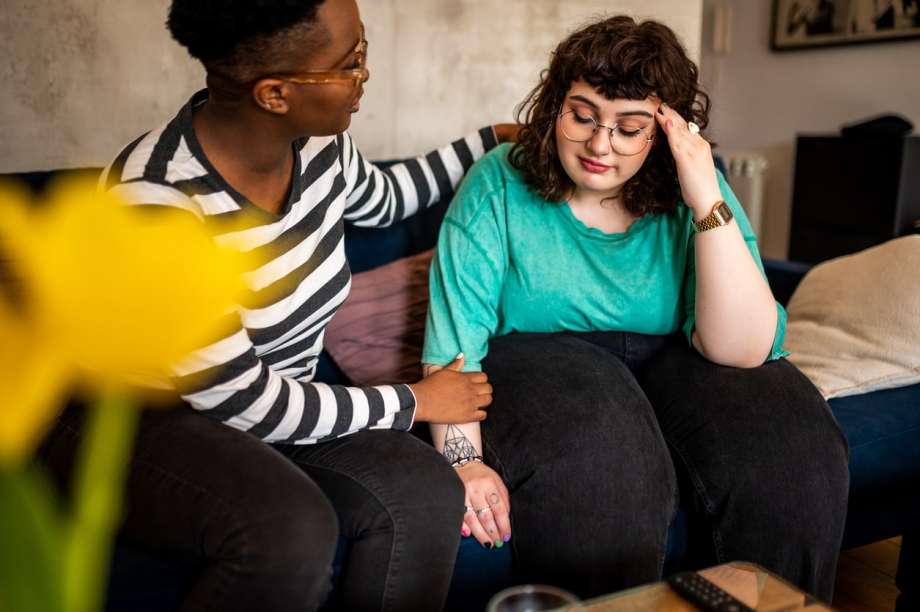What to Say to Someone Who Had a Miscarriage

Miscarriages are not often talked about. There’s a fear that it is too painful to bring up so many avoid the topic. However, it is estimated that one in four pregnancies ends in miscarriage.
It’s likely that there are friends and family members in your life who are silently dealing with infertility and pregnancy loss. Not talking about it can make someone feel ashamed, making their healing journey more challenging.
This article addresses the physical, emotional and mental impact that experiencing miscarriage or pregnancy loss typically brings and ways for their partner, family members and loved ones to offer support.
In order to address the sensitive topic of miscarriage and dealing with pregnancy loss grief with utmost care, we consulted two fertility experts: Naomi Woolson and Kenzi Locks to share their experience and advice.
Kenzi Locks is the creator of Growforth Family Building, a licensed clinical social worker, health and wellness coach, and family-building expert. She has worked with hundreds of families coping with infertility, as well as those finding their way to becoming an LGBTQ+ parent or single parent by choice.
Naomi Woolfson is the creator of Embrace Fertility. She is a therapist specializing in supporting women through trying to conceive, fertility treatments and pregnancy and birth counseling – particularly following periods of infertility.
What is a Miscarriage?
A miscarriage, medically referred to as a spontaneous abortion, is the unfortunate and involuntary loss of a pregnancy during its early stages, typically before the 20th week of gestation. This heartbreaking event often occurs due to various underlying factors, most of which are beyond a woman’s control.
The most common cause of miscarriage is chromosomal abnormalities, where the developing embryo has an incorrect number of chromosomes, preventing it from growing and developing properly. These abnormalities can occur randomly and are not indicative of any fault on the part of the mother.
Other factors contributing to miscarriage may include hormonal imbalances, maternal health conditions like diabetes or thyroid disorders, infections, uterine abnormalities, or lifestyle factors such as smoking, excessive alcohol consumption, or drug use.
Every woman experiences a miscarriage differently; however, it generally involves the sudden onset of vaginal bleeding, often accompanied by abdominal cramping and the passage of tissue.
It’s essential for individuals experiencing a miscarriage to seek medical attention for both their physical and emotional well-being. In many cases, a miscarriage is a single, isolated event, and most women who experience one go on to have healthy pregnancies in the future.
However, recurrent miscarriages may necessitate a thorough medical evaluation to identify and address any underlying causes, offering hope for successful pregnancies in the future.
Physical Effects of a Miscarriage
Miscarriage can impact every area of life affecting physical, mental and emotional health.
Locks explained that miscarriage can have any number of effects on an individual’s physical health. These include the following:
Pain
The physical experience of miscarriage often involves abdominal pain, cramping, and bleeding over days or weeks.
Hormonal Changes
Hormones, especially those related to pregnancy, can fluctuate significantly during and after a miscarriage, leading to mood swings and physical discomfort.
Severe Health Complications
In some cases, miscarriage may require medical intervention or emergency care. In extreme cases, if high levels of care are needed and not received, there can be a risk to the individual’s fertility or life.
Mental Effects of a Miscarriage

Locks discussed the impact of a miscarriage on a grieving person’s mental health:
Anxiety and Depression
Miscarriage can trigger or exacerbate anxiety and depression symptoms or diagnoses in some individuals.
Coping with the loss and the fear of future pregnancies can be particularly challenging. Individuals must often develop and hone new coping mechanisms to manage these heightened emotions.
A study showed that women suffering from depression, stress and anxiety are twice as likely to have problems conceiving. Those who have experienced at least one unsuccessful IVF cycle and had depressive symptoms before continuing IVF treatment experienced a lower success rate than women who did not experience depressive symptoms.
Post-Traumatic Stress
In some cases, individuals may develop symptoms of post-traumatic stress disorder (PTSD), especially if the miscarriage was traumatic or if they had previous traumatic experiences related to pregnancy.
Grief and Emotional Effects of a Miscarriage
Miscarriage can impact emotional health in both the short and long term.
“Emotionally you are dealing with the loss as your body is…in a state of shock with many pregnancy hormones remaining in your body weeks after the miscarriage,” explains Woolfson.
Locks added that there are no timelines for the grieving process, and the loss may affect the individuals involved for a long time. She provided the following ways a miscarriage can impact your emotional well-being:
Grief and Loss
The emotional pain of miscarriage can be profound. Many individuals experience grief and a sense of loss, just like losing any loved one.
The loss can be further complicated because of all the hope for the future the baby might have represented. Emotions may include sadness, anger, self-blame, and even numbness.
Isolation
It’s not unusual for those who have experienced a miscarriage to isolate themselves from those around them. Isolation can happen to avoid triggers (i.e., seeing babies or a pregnant woman or to avoid difficult conversations and lack of empathy).
Woolfson shared that you may need to take time off from your work and strain can be placed on relationships as you may feel that people don’t understand what you are going through.
How Can You Comfort Someone Who Had a Miscarriage?

It can be challenging to know how to offer comfort to someone who has experienced a miscarriage, but your support and empathy can make a significant difference during their difficult time.
Remember, the most important thing is to let them know you care and are there for them in whatever they need you to be.
Helpful Things To Do For Someone After Pregnancy Loss
Locks shared the following ways to offer help to a friend or loved one who has experienced a miscarriage:
Respect Their Grief
Understand that grief is personal and can vary widely from person to person. Let them grieve in their own way. Go in without expectations of how they should feel, think, or act. Instead, follow their lead.
Express Empathy
Start by acknowledging their pain and expressing your condolences. A simple, heartfelt “I’m so sorry for your loss; I am thinking of you” is often comforting.
Actively Listen
Sometimes, just being a listening ear to someone who has experienced a miscarriage without feeling you should equally verbally contribute to the conversation is the most helpful thing you can do.
Express that you’re open to listening to them as they share their feelings and experiences. However, don’t pressure them to share beyond their comfort level. Think of it as opening the door for them to walk through but not dragging them through it.
Offer Practical Support
Those surrounded by grief and the physical aftermath of a miscarriage may struggle to identify the tasks and ask for help. It’s often far more helpful to say, “I’d like to make you a home-cooked meal this week.
What day would work best for you?” than to say, “Let me know what I can do for you!” Assistance with daily tasks, such as cooking, cleaning, or child care of other children, might be very helpful.
Check-In
Continue to check in on them in the weeks and months following the miscarriage. There is no timeline by which they need to be “done” grieving their baby, and they may need ongoing support.
Honor Their Baby
You can ask if it’s okay to light a candle, plant a tree, say a prayer, or do something authentic and meaningful to honor their baby. You can also ask if they have a name or nickname for their baby that they’re comfortable sharing.
If they share a name, use the baby’s name when speaking about them. Some individuals look for signs of their baby in the world (like butterflies, rainbows, or certain flowers).
If they let you know that, simply sending them a photo if you see something that they connect with their baby can be heartwarming.
Things To Avoid When Someone Experienced a Pregnancy Loss
Locks gave the following advice on how support should not look like:
Don’t Ignore the Loss
Often, when we’re unsure what to do, out of fear of causing harm, we don’t do anything — which in and of itself causes damage.
Pretending the loss didn’t happen or distancing from the individuals who experienced the loss is not the right approach. It’s much better to spend the time to figure out what to do than to do nothing at all.
Don’t Minimize the Loss
Avoid minimizing the miscarriage by saying things like “It wasn’t meant to be,” “Be grateful that you can try again,” “Look on the bright side,” or “At least you were only XX weeks along.”
These comments can be hurtful and dismissive. They can lead to disconnection in your relationship with the individual who had a miscarriage and harm them emotionally.
Don’t Offer Unsolicited Advice
Refrain from offering advice or suggesting solutions unless they specifically ask for it — whether about future pregnancies, how to move forward, etc. Everyone’s experience is unique.
Don’t Ask Blaming Questions
Avoid questions or comments that imply blame, such as “Did you do something to cause this?” Such questions can be deeply hurtful and cause far more harm.
Don’t Make Comparisons
Avoid comparing the person’s experience to others’ experiences. Each person’s journey is unique, and comparisons can be invalidating.
Helpful Things To Say To Someone Who Had a Miscarriage
It can be difficult to find the right words to say to someone who experienced a pregnancy loss.
Woolfson shared ways to talk or text messages to send to someone who has experienced a pregnancy loss:
“Thank you for confiding in me. How can I support you during this time? What do you need physically? Practically? Emotionally? Shall I bring you a pot roast?”
If you have children yourself: “Is being around children/my baby triggering? I understand if you would rather just meet up with me during this time rather than the whole family.”
“I read an interesting article on ways you can support yourself emotionally while going through a miscarriage. Would you like me to tell you about it or send you a link?”
“I’m here for you whenever you want to talk or maybe just be distracted.”
Things To Avoid Saying To Someone Who Had a Miscarriage
Woolfson shared some wrong things to say when comforting a friend who has experienced a pregnancy loss:
“Well at least you know you can get pregnant.”
“I work with many women who experience recurrent miscarriage. Being able to get pregnant and stay pregnant are two separate things,” advises Woolfson.
“At least it was early.”
We are each different and each experiences grief and loss in a different way. For some individuals, losing a pregnancy in the first two months may feel sad; however, for others, especially if they have been trying to conceive for an extended amount of time, miscarriage can feel as devastating as losing a child. It is not just the pregnancy you have lost but your hopes and dreams.
“Maybe god or life is punishing you.”
“You may be surprised by the number of women who have told me that their friends/family/community have actually said this to them.
One in four pregnancies ends in miscarriage; in the vast majority of cases, we will never know the cause or reason for the loss. Adding blame and guilt to an already emotionally charged situation is not helpful,” added Woolfson.
“Stay positive.”
Woolfson explained, “I named my business Embrace Fertility as it is extremely important that we embrace all of the emotions we feel. Saying to someone who is grieving that they should stay positive is toxic positivity which can be harmful and create disconnection.”
“Babies are hard work.”
A thousand nos. The person who has experienced a miscarriage may have mixed emotions depending on whether they were actively trying to get pregnant or not. It is not your place to comment on whether or not you think they should or are ready to become a parent.
Supporting someone through a difficult time like a miscarriage is a compassionate gesture, and your kindness will surely make a difference.
Additional Pregnancy Loss Resources
Miscarriage can be hard on grieving parents. Here are some available resources and support groups for dealing with miscarriage or grief from pregnancy loss:
There is no “right” or “wrong” way to grieve a baby. If someone in your life has recently experienced a pregnancy loss, providing comfort, support and love are all valuable ways to show you care for them during this difficult time.

